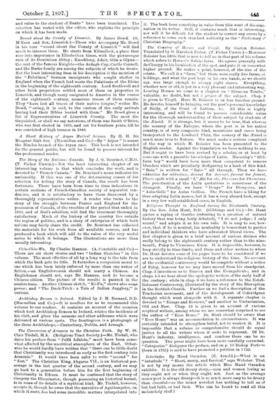Religious Thought in England during the Nineteenth Century. By the
Rev. John Hunt, D.D. (Gibbings and Co.)—Dr. Hunt quotes a saying of Goethe (referring to a question of natural history that was being hotly debated), " I do not judge ; I only record," and adopts it as his own rule. It is easy to see, how- ever, that if he is neutral, his neutrality is benevolent to parties and individual thinkers who have advocated liberal views. The first chapter is given to a brief account of various divines who really belong to the eighteenth century rather than to the nine- teenth, Paley to Vicesimus Knox. It is impossible, however, to keep strictly to time limits, and these and other writers to whom Dr. Hunt devotes some of his pages have to be considered if we are to understand the religious history of the time. No account of the evidential controversy would be complete without a notice of Paley, however far we may have moved from his standpoint. Chap. 3 introduces us to Simeon and the Evangelicals ; and in chaps. 4-5 we hear about the apologetic writers of the early half of the century ; while in chap. 6 we have a reference to the Estab- lishment Controversy, illustrated by the story of the Disruption in the Scottish Church. Further on we find a description of the Tractarian movement, and of the development of Coleridgean thought which went alongside with it. A separate chapter is devoted to " Essays and Reviews," and another to Unitarianism, Old and New. Chap. 19 is given to an account of various sceptical writers, among whom we are somewhat surprised to see the author of "Ecce Homo." Dr. Hunt should be aware that "Ecce Homo" was an accommodation to circumstances. It was certainly intended to strengthen belief, not to weaken it. It is impossible that a volume so comprehensive should do equal justice to all the writers whom it seeks to represent. Of Dr. Hunt's industry, intelligence, and candour there can be no question. The press might have been more carefully corrected. " Catagorise " disfigures the preface, and on p. 10 Bishop Porteus (born in 1731) is said to have promoted a petition in 1722.






































 Previous page
Previous page